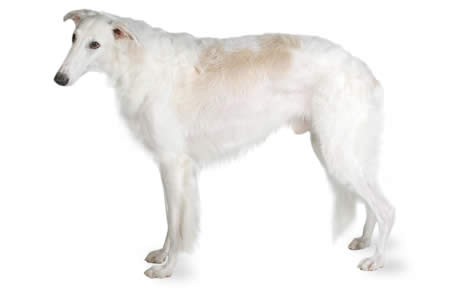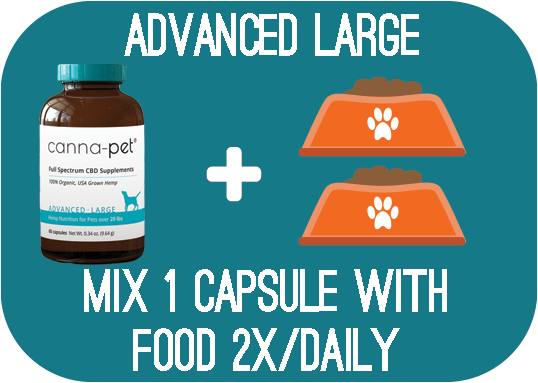Borzoi Breed Guide

Breed Group:
Hound Dogs
Get 30% off
Join our Newsletter
Sign Up Today
Borzoi Background Info and History
The Borzoi is a large sized dog breed that was bred and cultivated in Russia to hunt wolves and other big game. Up until the mid-1930s this breed was known as the Russian Wolfhound in the United States.
Borzois are a tall and powerful breed capable of running up to 40 miles per hour. In the modern day, Borzois have left behind their roots as a hunting breed, instead serving as companion dogs and competing in a number of dog sports.
Borzoi Temperament and Personality
Borzois are an independent and regal breed. They exhibit a strong streak of loyalty and affection towards those close to them. They are sensitive and intuitive and can be loving companions for the right owner.
Borzoi Training Tips
Borzois need a patient and creative trainer and obedience training is recommended. In addition, this breed should be socialized starting from a young age. Borzois respond best to positive reinforcement training and don’t do well with scolding or anger.
Exercise Needs to Borzois
Borzois are an active, large breed that need room to grow and run. Exercise should be done on a leash as their prey drive can cause them to chase other animals. Borzois are also sensitive to heat, so owners in hot climates need to exercise these pups with care.
Borzoi Lifespan
Borzois live between 9-14 years.
Borzoi Breed Popularity
Borzois are an averagely popular large dog breed and currently rank as the 98th most popular AKC registered breed.
Feeding Requirements of Borzois
Borzoi should be fed a high-quality diet that consists of a good mix of healthy proteins and fats. In addition, it is recommended to avoid any foods with grain-based fillers.
Feeding requirements will vary greatly depending on the weight and energy levels of the specific dog. The average Borzoi weighs between 60-105 lbs., so expect to feed them anywhere between 3 ½ to 4 ¾ cups of dry food a day, split into two even meals.
Borzoi Grooming
Since Borzois coats can be long and sometimes curly, it is recommended to brush this dog breed daily to minimize shedding. As with any breed, a consistent grooming routine is necessary to keep your pup happy and healthy. Borzois are a fairly clean breed, so frequent bathing your dog is unnecessary and can dry out his skin.
Are Borzois Good With Kids?
Borzoi are recommended for families with older children. Younger children may be inadvertently hurt by them due to their large size.
Health Problems of Borzois
Osteosarcoma
Canine Osteosarcoma, or bone cancer, is the number one leading cause of mortality in the Borzoi breed, affecting approximately 7% of the breed. Bone cancer is a common ailment that affects nearly all large dog breeds. In most cases, cancerous cells form in the long bones of Borzoi.
Bone cancer begins in the central part of the bone and progresses outward, compromising the affected bone and then metastasizing and spreading throughout the body. Be mindful if your Borzoi exhibits signs of lameness that last for a period of days, or if you notice any swelling around a lesion on your dog’s body.
Gastric Torsion
Gastric torsion is commonly referred to as canine bloat. Large dog breeds are at the highest risk of developing this life-threatening condition. Gastric torsion occurs when food and gas builds up in the stomach and isn’t released fast enough. As the pressure with the stomach builds the stomach expands, reducing the ability of the body to excrete material through the intestines.
The expansion of the stomach places pressure on the surrounding blood vessels, reducing the flow of oxygenated blood to the affected tissue. In some cases, the rapid expansion causes the stomach to flip within the abdominal cavity, an occurrence known as volvulus. Both gastric torsion and volvulus are a life-threatening situation that needs emergency medical attention.
Hypothyroidism
Hypothyroidism in dogs is a condition where the thyroid gland produces an insufficient amount of the hormone thyroxine. Thyroxine is responsible for regulating metabolic activity. Affected dogs will exhibit signs of decreased metabolic activity, which usually results in low energy levels, weight gain, muscle fatigue, and hair loss.
Sensitivity to Anesthesia
Borzois are sensitive to certain types of anesthesia. This is due to their low levels of body fat, which causes absorption of these drugs to differ from other dogs. Owners of Borzoi should be proactive in discussing this issue with their veterinarian prior to any surgery or administration of anesthetic.
Other Resources
National Breed Website: Borzoi Club of America





